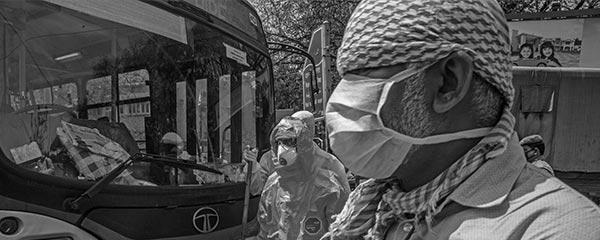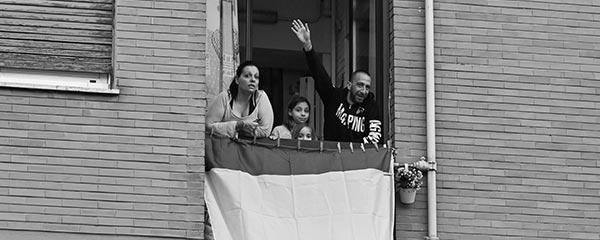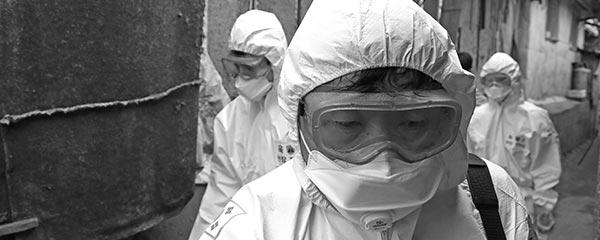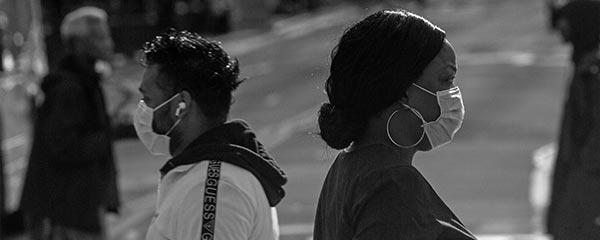Thousands of confirmed cases of COVID-19 have been reported across Southeast Asia, with the highest levels, thus far, occurring in Malaysia, the Philippines and Indonesia. The disease is virtually guaranteed to continue to spread in the region, despite widespread efforts to prevent it.
Responding to the situation in Southeast Asia will mean relying on high levels of trust in medical professions that a shows existed before the pandemic, while building trust in health advice from the government, which is relatively low in a number of countries, including Thailand and Vietnam.
Overall, a median of 87% of adults in Southeast Asia surveyed in 2018 said they trust doctors and nurses in their country "a lot" or "some," but the degrees of trust varied substantially from country to country. In several countries, trust in doctors and nurses was nearly ubiquitous, including 96% of the population in Thailand and 95% in Malaysia and Singapore.
| A lot | Some | Total | |||||||||||||||||||||||||||||||||||||||||||||||||||||||||||||||||||||||||||||||||||||||||||||||||
|---|---|---|---|---|---|---|---|---|---|---|---|---|---|---|---|---|---|---|---|---|---|---|---|---|---|---|---|---|---|---|---|---|---|---|---|---|---|---|---|---|---|---|---|---|---|---|---|---|---|---|---|---|---|---|---|---|---|---|---|---|---|---|---|---|---|---|---|---|---|---|---|---|---|---|---|---|---|---|---|---|---|---|---|---|---|---|---|---|---|---|---|---|---|---|---|---|---|---|---|
| % | % | % | |||||||||||||||||||||||||||||||||||||||||||||||||||||||||||||||||||||||||||||||||||||||||||||||||
| Malaysia | 68 | 27 | 95 | ||||||||||||||||||||||||||||||||||||||||||||||||||||||||||||||||||||||||||||||||||||||||||||||||
| Philippines | 59 | 28 | 87 | ||||||||||||||||||||||||||||||||||||||||||||||||||||||||||||||||||||||||||||||||||||||||||||||||
| Singapore | 54 | 41 | 95 | ||||||||||||||||||||||||||||||||||||||||||||||||||||||||||||||||||||||||||||||||||||||||||||||||
| Thailand | 52 | 44 | 96 | ||||||||||||||||||||||||||||||||||||||||||||||||||||||||||||||||||||||||||||||||||||||||||||||||
| Myanmar | 49 | 42 | 91 | ||||||||||||||||||||||||||||||||||||||||||||||||||||||||||||||||||||||||||||||||||||||||||||||||
| Lao People's Democratic Republic | 44 | 38 | 82 | ||||||||||||||||||||||||||||||||||||||||||||||||||||||||||||||||||||||||||||||||||||||||||||||||
| Cambodia | 29 | 53 | 82 | ||||||||||||||||||||||||||||||||||||||||||||||||||||||||||||||||||||||||||||||||||||||||||||||||
| Indonesia | 25 | 59 | 84 | ||||||||||||||||||||||||||||||||||||||||||||||||||||||||||||||||||||||||||||||||||||||||||||||||
| Vietnam | 23 | 60 | 83 | ||||||||||||||||||||||||||||||||||||||||||||||||||||||||||||||||||||||||||||||||||||||||||||||||
| Wellcome Global Monitor, 2018 | |||||||||||||||||||||||||||||||||||||||||||||||||||||||||||||||||||||||||||||||||||||||||||||||||||
Majorities in Indonesia and Vietnam trust their doctors and nurses, but one in four or fewer said they trust doctors and nurses a lot. In Vietnam, the country's largely rural population and disparities in healthcare between urban and rural areas may contribute to a lack of trust. In Indonesia, the healthcare system has also struggled to bring affordable medical care to all segments of the country's population, though the government recently introduced universal health insurance. Indonesia has also experienced the highest rate of death from COVID-19 of any country in Southeast Asia.
Similar Levels of Trust in Advice From Medical Professionals, Government
Generally, across Southeast Asia, residents expressed similar levels of trust in the medical advice they get from medical professionals and from their governments. For instance, in Singapore, 95% of the public say they have "a lot" or "some" trust in health advice from doctors or nurses, while 92% say they have a lot or some trust in this advice from their government.
| Doctors or Nurses | Government | ||||||||||||||||||||||||||||||||||||||||||||||||||||||||||||||||||||||||||||||||||||||||||||||||||
|---|---|---|---|---|---|---|---|---|---|---|---|---|---|---|---|---|---|---|---|---|---|---|---|---|---|---|---|---|---|---|---|---|---|---|---|---|---|---|---|---|---|---|---|---|---|---|---|---|---|---|---|---|---|---|---|---|---|---|---|---|---|---|---|---|---|---|---|---|---|---|---|---|---|---|---|---|---|---|---|---|---|---|---|---|---|---|---|---|---|---|---|---|---|---|---|---|---|---|---|
| % | % | ||||||||||||||||||||||||||||||||||||||||||||||||||||||||||||||||||||||||||||||||||||||||||||||||||
| Singapore | 95 | 92 | |||||||||||||||||||||||||||||||||||||||||||||||||||||||||||||||||||||||||||||||||||||||||||||||||
| Thailand | 95 | 82 | |||||||||||||||||||||||||||||||||||||||||||||||||||||||||||||||||||||||||||||||||||||||||||||||||
| Myanmar | 93 | 90 | |||||||||||||||||||||||||||||||||||||||||||||||||||||||||||||||||||||||||||||||||||||||||||||||||
| Malaysia | 92 | 89 | |||||||||||||||||||||||||||||||||||||||||||||||||||||||||||||||||||||||||||||||||||||||||||||||||
| Philippines | 87 | 83 | |||||||||||||||||||||||||||||||||||||||||||||||||||||||||||||||||||||||||||||||||||||||||||||||||
| Lao People's Democratic Republic | 80 | 78 | |||||||||||||||||||||||||||||||||||||||||||||||||||||||||||||||||||||||||||||||||||||||||||||||||
| Indonesia | 78 | 77 | |||||||||||||||||||||||||||||||||||||||||||||||||||||||||||||||||||||||||||||||||||||||||||||||||
| Vietnam | 78 | 69 | |||||||||||||||||||||||||||||||||||||||||||||||||||||||||||||||||||||||||||||||||||||||||||||||||
| Cambodia | 75 | 76 | |||||||||||||||||||||||||||||||||||||||||||||||||||||||||||||||||||||||||||||||||||||||||||||||||
| Wellcome Global Monitor, 2018 | |||||||||||||||||||||||||||||||||||||||||||||||||||||||||||||||||||||||||||||||||||||||||||||||||||
However, in Thailand and Vietnam, residents lean toward trusting their medical professionals more than their government. In Thailand, 95% of the public has trust in health advice from medical professionals, compared with 82% who say the same of advice coming from the government. In Vietnam, the gap is slightly less pronounced, with 78% of the public expressing trust in advice from doctors and nurses, compared with 69% who say the same about the government.
Most in Southeast Asia Trust Medical Professionals Most for Health Advice
Across all countries in Southeast Asia, adults were most likely to say they trusted medical professionals most for health advice -- consistent with results in most parts of the world. However, this trust varied across the region.
Roughly nine in 10 residents in Singapore, Malaysia and Thailand say they look to a doctor or nurse most. Alternatively, roughly three in four or fewer say they trust medical professionals most in Indonesia, Laos, Cambodia and the Philippines.
| A doctor or nurse | Your family and friends | A religious leader | A famous person | ||||||||||||||||||||||||||||||||||||||||||||||||||||||||||||||||||||||||||||||||||||||||||||||||
|---|---|---|---|---|---|---|---|---|---|---|---|---|---|---|---|---|---|---|---|---|---|---|---|---|---|---|---|---|---|---|---|---|---|---|---|---|---|---|---|---|---|---|---|---|---|---|---|---|---|---|---|---|---|---|---|---|---|---|---|---|---|---|---|---|---|---|---|---|---|---|---|---|---|---|---|---|---|---|---|---|---|---|---|---|---|---|---|---|---|---|---|---|---|---|---|---|---|---|---|
| % | % | % | % | ||||||||||||||||||||||||||||||||||||||||||||||||||||||||||||||||||||||||||||||||||||||||||||||||
| Singapore | 93 | 4 | 1 | 0 | |||||||||||||||||||||||||||||||||||||||||||||||||||||||||||||||||||||||||||||||||||||||||||||||
| Malaysia | 91 | 4 | 4 | 1 | |||||||||||||||||||||||||||||||||||||||||||||||||||||||||||||||||||||||||||||||||||||||||||||||
| Thailand | 89 | 6 | 2 | 0 | |||||||||||||||||||||||||||||||||||||||||||||||||||||||||||||||||||||||||||||||||||||||||||||||
| Myanmar | 80 | 9 | 4 | 2 | |||||||||||||||||||||||||||||||||||||||||||||||||||||||||||||||||||||||||||||||||||||||||||||||
| Vietnam | 79 | 15 | 1 | 1 | |||||||||||||||||||||||||||||||||||||||||||||||||||||||||||||||||||||||||||||||||||||||||||||||
| Indonesia | 76 | 7 | 6 | 2 | |||||||||||||||||||||||||||||||||||||||||||||||||||||||||||||||||||||||||||||||||||||||||||||||
| Lao People's Democratic Republic | 75 | 15 | 1 | * | |||||||||||||||||||||||||||||||||||||||||||||||||||||||||||||||||||||||||||||||||||||||||||||||
| Cambodia | 73 | 19 | 2 | 1 | |||||||||||||||||||||||||||||||||||||||||||||||||||||||||||||||||||||||||||||||||||||||||||||||
| Philippines | 70 | 22 | 4 | 1 | |||||||||||||||||||||||||||||||||||||||||||||||||||||||||||||||||||||||||||||||||||||||||||||||
| * less than 0.5% | |||||||||||||||||||||||||||||||||||||||||||||||||||||||||||||||||||||||||||||||||||||||||||||||||||
| Wellcome Global Monitor, 2018 | |||||||||||||||||||||||||||||||||||||||||||||||||||||||||||||||||||||||||||||||||||||||||||||||||||
The second most trusted source of medical advice throughout the region is family and friends. This source is particularly well trusted in the Philippines, where 22% of the population trusts family and friends most for medical advice, and in Cambodia, where 19% say the same. This is followed by Vietnam and Laos, where 15% of each country's population say they trust family and friends most for medical advice.
Bottom Line
While many governments in the region have already instituted efforts to lock down their populations to protect them from COVID-19, ensuring widespread compliance will still require trust in medical advice instructing their populations to engage in social distancing. This is particularly important as the economic impact of the disruption created by the disease begins to bite into these country's publics.
While people in most Southeast Asian countries have high levels of trust in the institutions that are key to fighting COVID-19, the data illustrate potential vulnerabilities in some countries. The substantial populations of Vietnam, Laos, Cambodia and the Philippines who trust their families and friends most for medical advice may be most susceptible to false or misleading information, which may undermine efforts to control COVID-19 in these countries. In 2018 and 2019, medical misinformation was identified as contributing to the measles outbreak in the Philippines, demonstrating the potential vulnerability of countries in the region to similar issues relating to COVID-19.
.




